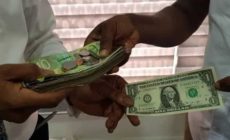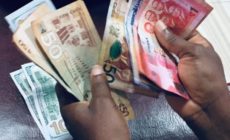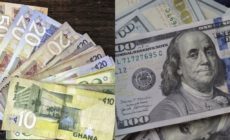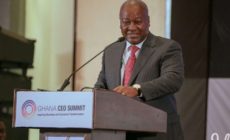Cedi to trade at GH¢4.10 against dollar
- Posted on
- Comment
 The Ghana cedi could trade between GH¢3.97-4.10 to the US dollar in the next two months, Ecobank Research has predicted.
The Ghana cedi could trade between GH¢3.97-4.10 to the US dollar in the next two months, Ecobank Research has predicted.
In its latest Ghana Economic Strategic Report for Quarter 3, the renowned research institution based in London said the dollar will be in high demand in tandem with a robust import demand.
It explained that “the Monetary Policy Rate will be cut once there is a clear indication that inflation is slowing and that the Ghana cedi stability has continued”.
The MPR is set to remain elevated in the third quarter of this year due to high inflation expectations and exchange rate concerns.
It added that “Treasury-bill yields could remain around 22-25 percent as investor uncertainty over Ghana’s imbalances hold prices down”.
On inflation, it said that inflation is likely to remain in high double digits in the third quarter of 2016, adding, the May 2016 acceleration in the producer price inflation to 11.3 percent points to further rise in inflation.
Despite growing uncertainty in the global economy, confidence in the Ghanaian economy continues to rise, thanks to ongoing IMF engagement under the three-year Extended Credit Facility that began in April 2015.
However, growing external headwinds, particularly tight global financing conditions and slower growth in China will have negative implications for Ghana’s capital and currency markets through the third quarter, Ecobank Research noted.
“Uncertainty over Brexit will also go some way towards undermining potential investments into Ghana.”
The local currency ended the first half of this year with a depreciation rate of 3.04 percent against the US dollar.
It traded at almost GH¢3.99 to the ‘green back’ at the forex bureau and GH¢3.93 on the interbank market.
Key Risks, Triggers & Pressure Points
• A further fall in oil, cocoa and gold prices would add pressure to foreign excahnge reserves, weakening the Ghana cedi outlook.
• Poor progress with reforms will undermine stabilisation efforts, raising inflation and Ghana cedi concerns.
• Further hikes in US interest rates could increase capital outflows, raising exchange rate risk.
• Extended eurozone depression, slowing activity in China, and higher oil prices all pose potential challenges.
By Augustine Amoah










 (Selorm) |
(Selorm) |  (Nana Kwesi)
(Nana Kwesi)